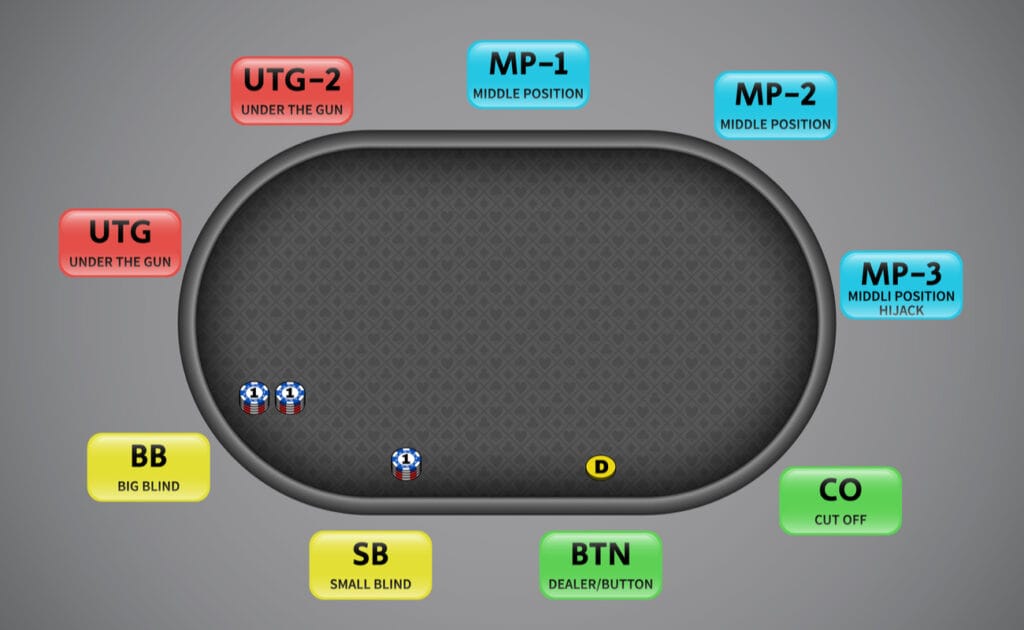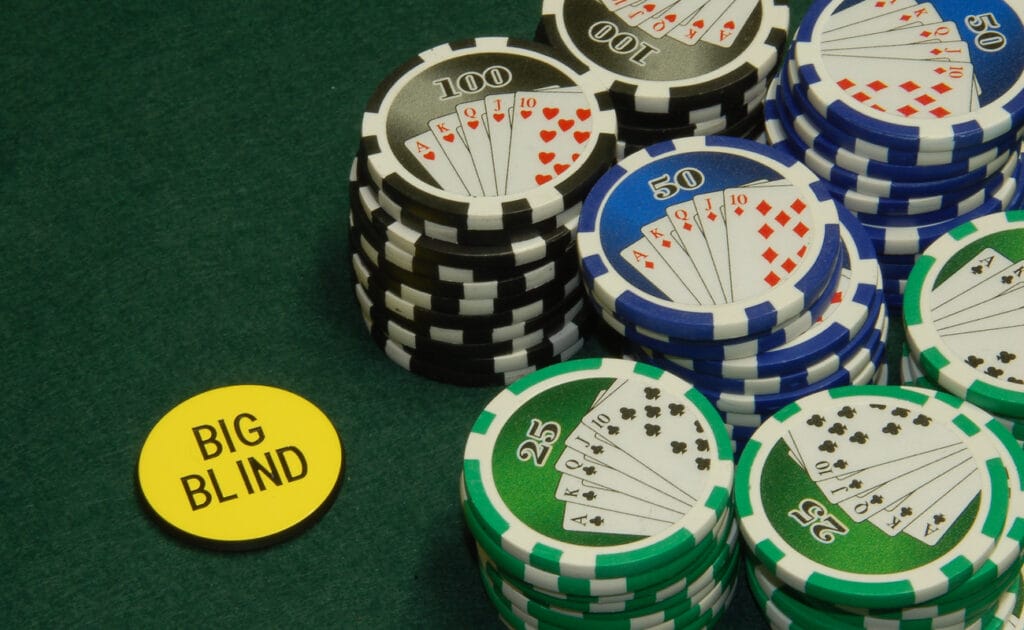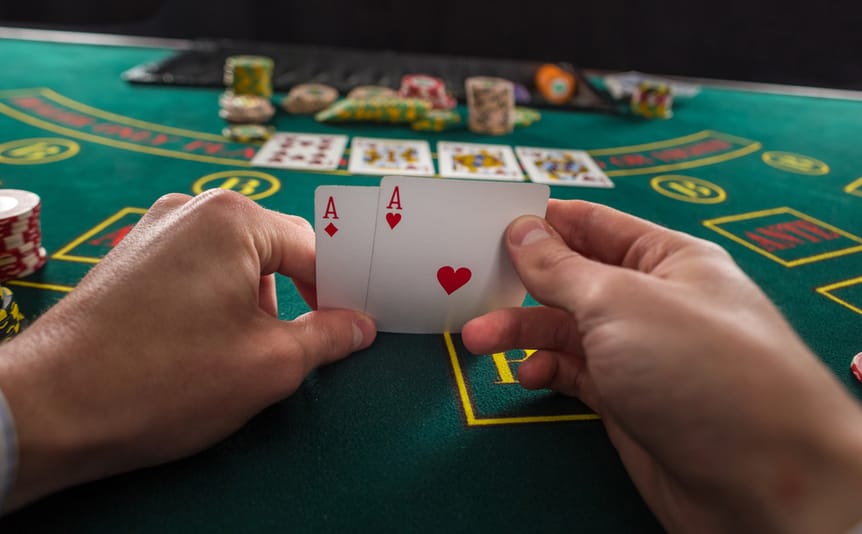
As a beginner poker player, there are two questions you should ask yourself as you build up your skills. Firstly, how important is position in poker? And secondly, why is position important in poker? As you’ll discover, your position at the table is one of the most crucial aspects to consider, whether you’re playing in-person or online poker. Poker positioning is something that beginners often overlook when they start playing poker online, and, unfortunately, this can have a massive impact on the outcome of their games.
In this blog, you’ll learn more about poker positions, gain an understanding of the starting poker table positions, and discover how your position will impact your strategy.
What Is Position in Poker?
For those who aren’t sure, when people talk about position in poker, they’re simply talking about the order in which players are allowed to act. “Out of position” refers to the player who acts first, while ‘in position’ refers to the player who acts last because the player who acts last has a distinct advantage. They get to see how their opponents approach the hand, making it easier for them to make potentially beneficial (and profitable) decisions. As a result, the general rule of thumb is to play more hands “in position” unless you have especially promising cards when “out of position.”
Preflop and Postflop Positions
Before getting into the heart of the poker table positions, it’s important to understand two scenarios relative to the success of a player’s position: the preflop and postflop.
The table is split into different positions during the preflop round, and you’ll be playing from the early, middle, or late position, or you could be the blinds. These positions break down further depending on your exact seat, which you’ll learn more about later.
During postflop rounds, your seat position doesn’t matter too much, as you’ll be “in position” if you act last and “out of position” if you act first — you’ll be somewhere in between if there are more than two players in the pot.
It’s crucial to remember that preflop and postflop positions are related. If you’re in an early position preflop, you’ve got a big chance of playing ‘out of position; postflop and vice versa.
The fact that your poker table position in preflop has a big impact on your position in postflop is an essential factor in determining your opening strategy.
What Are the Starting Positions in Poker?
The starting/preflop positions in poker each have a particular name, which helps the best online poker players get a better idea of which cards they should play and how their opponents might play.
There are four seating categories:
- Early position.
- Middle position.
- Late position.
- The blinds.
The naming of the positions can change slightly depending on the number of players seated at the table, but in this case, the focus is on a full-ring (nine-handed) format, which is the most common.
The image below shows the positions around a poker table:

- Red: Early positions.
- Blue: Middle positions.
- Green: Late positions.
- Yellow: Blinds.
The acronyms that you see above are:
- UTG: Under the gun.
- MP: Middle position.
- HJ: Hijack.
- CO: Cutoff.
- BTN: Button.
- SB: Small blind.
- BB: Big blind.
Early Positions

The first seat is referred to as “under the gun” (UTG), as this is the player who is under pressure to act first.
This is a difficult hand to play because eight other players are waiting to act after UTG. If you decide to play your hand, another player could have a premium. Even if the other players play mediocre hands, you have to remember you’ll be out of position postflop, so you must carefully select which hands you play.
The key takeaway from the UTG position is that you need a very strong hand to consider entering the pot, given how many players are making decisions after you.
The next position to play will be the UTG-2, and because there is one less player, this player can play a slightly weaker hand. In general, though, this player should play in much the same way as the UTG.
Middle Positions
The middle position is still a fairly conservative one; however, you do have a few more hand combos to play when compared to UTG. This is because the two players who have likely already folded decrease your chances of coming up against a strong hand, and there’s less chance you’ll be forced to play out of position postflop.
MP-2 plays in much the same way as MP. The MP-3/HJ (hijack) can play more hands than the other MP positions, with about a 19% opening range because fewer players are in the pot.
Late Positions
Late positions are always beneficial in poker. It’s not until getting to the cutoff (CO) that the opening range really starts to open up. There’s about a 26% opening range for the CO, so they have the option to play a lot more hands than the HJ.
The dealer/on the button (BTN) can play even more hands than the CO, with around a 43% opening range if suitable players are in the blinds. There are so few players left to play after the late positions (three for cutoff and two for the button), and if there is action, these players will be “in position” against the blinds.
The BTN will always act last when playing postflop, which means it’s the best position in poker.
The Blinds

The blinds vary quite decidedly from the other positions. Firstly, the blinds must put a small fee into the pot before they can look at their cards.
When playing from the blinds, you’ll most likely react to other players’ raises rather than making them yourself. This needs a completely different strategy from those discussed above. You’ll have to call much more frequently, particularly if you’re the big blind.
The small blind is probably the worst seat at the table. You’ll always be “out of position” and act with less information than all the other players. The big blind is often the least profitable seat, given that this player must put the most money in the pot without seeing their cards.
There are only two advantages to the big blind. Firstly, because you’ve already invested a BB in the pot, you’ll usually have the option to “close the action” by calling and seeing the flop.
Closing the action guarantees you release some of your capital, and you could hit a piece of the flop. However, the SB isn’t as lucky; if you call a raise in this position, the BB could reraise with a squeeze, putting you in a difficult situation.
Other Factors To Consider When Making Decisions at the Poker Table
Now that you understand the importance of position in poker, it’s time to delve into some other factors that will affect your decision-making at the table.
1. Player Tendencies
Pay attention to how your opponents play. Are they tight or loose? Aggressive or passive? Understanding their tendencies can help you predict their actions and adjust your strategy accordingly.
2. Stack Sizes
Consider your stack size compared to the other players’ stacks. This influences the potential risk and reward of a given hand. A big stack might be more willing to take risks, while a short stack may be more desperate and aggressive.
3. Table Image
Be aware of the image you’ve created for yourself at the table — in short, how do the other players see you? If you’ve played aggressively, opponents may be more likely to fold to your bets. Conversely, if you’ve been passive, they might be more inclined to challenge you.
4. Pot Odds and Expected Value (EV)
Evaluate the pot odds and EV of your decisions. Consider the pot size in relation to the bet you need to call. It might be a favorable decision if the potential reward outweighs the risk.
5. Community Cards
Assess the texture of the community cards and how they might impact your hand and the potential hands of your opponents. Consider possible draws and completed hands on the board.
Play Online Poker With Borgata
As you can see, playing “in position” in poker is much more beneficial than playing ‘out of position.’ It’s essential you understand the various positions and how this affects the hands you can play.
Borgata Online offers many casino table games, with poker being one of the most popular. Whether you’re looking for a free round of poker to practice your new position strategies, or you want to play Texas hold’Em, or even take part in Borgata Online’s famous online poker tournaments, there’s something for you. Register with Borgata Online for the best online poker.
